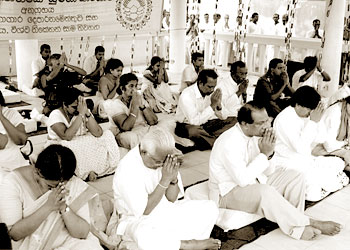Education as a tool of rehabilitation and integration
Prison Welfare Day - 'Prisoners are human beings':
by Indeewara Thilakarathne
As kith and kin of the inmates assemble in a long queue at the
entrance to the Welikada prison, waiting for their turn to visit the
inmates, Sri Lanka marked yet another Prison Welfare Day, leaving behind
manifold issues to be solved.
 A gamut of officials from rough handling police officers to the
charming and ever smiling welfare officers constitute the live-wire that
runs the system of prisons in Sri Lanka which is more or less modeled on
the British Prison system. A gamut of officials from rough handling police officers to the
charming and ever smiling welfare officers constitute the live-wire that
runs the system of prisons in Sri Lanka which is more or less modeled on
the British Prison system.
However, the prisons have been undergoing a dramatic transformation
from being Centres of punishing and condemning convicts to Centres of
reforming and rehabilitating convicts with aim of integrating them into
the mainstream society as fully-fledged citizens.
'Prisons in Sri Lanka are 400 per cent over crowded. However, out of
this 50.8 per cent are remandees. The main reason for this unprecedented
increase in intake is the lack of education. This is a fact which has
been proved beyond doubt.
Therefore, six month's ago, we opened an Open School in Palansena,
said Commissioner General of Prisons, Major General Vajira
Wijeyagoonawardena due to the ever increasing number of inmates, which
he attributed to the shortcomings of the society.According to the
Commissioner General, vocational training courses which had been
conducted over the years are being upgraded in keeping with the changes
in the labour market.
|

Commissioner General of Prisons, Major General Vajira
Wijeyagoonawardena |
As some of the courses would no longer provide employment, they have
been changed over to more employment-oriented courses such as training
in both software and hardware, ensuing that the inmate when released
will be able to earn a decent living.
Over 5,270 inmates who have done their O/Ls, are being provided with
training in Computer Hardware and Software which will improve
employability as well as their power of concentration. This
rehabilitation aspect has also been taken into consideration when
designing courses for inmates.
Another ambitious project to be commenced is a degree programme in
prisons for those inmates with A/L qualifications.
Negotiations, in this regard, have been conducted with the Open
University to open a branch in prison and commence courses in prisons,
leading to diverse degrees with the intension of integrating inmates
into the mainstream society as fully fledged citizens, substantially
contributing to the economy. This has been identified as an important
area in rehabilitation and social integration.
Long queues and smuggling of unauthorised items into the prison
Citing reasons for long queues and rather rough handling of kith and kin
of the inmates by the police officers in charge, the Commissioner
General revealed that this was simply due to the fact that relatives of
the inmates attempt to smuggle unauthorised items into the prison.
From the unfolded paper to cooked food items have been used for this
purpose. There are some instances where narcotics has been found
inserted into cooked beans and thousand rupee notes have been carefully
studded in unfolded newspapers. Some of the items used for smuggling
drug and money are tubes of tooth paste (remove the content and insert
drug), cooked chickens (insert money into them) and newspapers used to
wrap food parcels.
One of the amazing features of the money smuggled in wrapping papers
is that the notes were fitted into the paper as if they were part of the
papers.
Since there are no scanners and X-ray machines, each and every item,
besides body checking, everything else has to be manually checked.
Parcels containing food items, tooth paste and wrapping papers, have to
be dismantled and checked on item basis.
This meticulous process is being further complicated when relatives
visit without prior appointments and the authorities have to call the
particular inmate who is often engaged in diverse rounds and cannot be
easily found.
Re-convicted prisoners
According to statistics, each year, fourteen per cent of prisoners
who were released, have been re-convicted accounting for thirty per cent
of the present prison population.
The principle reason attributed to this is that when the breadwinner
is imprisoned, the family loses its sole income, often compelling the
wife to take over the business. This is common among drug dealers and
moonshine producers.
Commissioner General Wijeyagoonawardena has formulated a programme
whereby the District Secretaries are being informed of families of the
convicts in order to ensure that those families receive due social
benefit.
This pathetic situation is that as a result of the social stigma,
children of the convicts have to stop schooling and often wives either
fly for Middle East in search of employment or partners. Eventually they
also become prisoners.
Therefore, we commenced this islandwide programme to look after
families of the convicts, said Commissioner General Wijeyagoonawardena
this programme would ensure that family members of convicts are not
harassed or suffer owing to the social stigma.
Social stigma and perception
Commissioner General of Prisons, Wijeyagoonawardena urged the public
to accept released inmates as fully fledged citizens and families of
convicts should not be subject to harassment.
Stigmatisation and branding the released prisoners and the general
perception of them has to be changed as most of the prisoners are
victims of circumstances. The present social attitude will lead to a
serious social issue with many repercussions.
Currently the Government spends a sum of Rs. 100,000 billion on
prisoners. The number of intakes has been increased to 250 persons per
day and 90 per cent of the inmates are those who have been convicted on
minor offences for shorter terms, imprisonments (often 2 years) while
only 10 per cent are charged for criminal offences. It is basically
impossible for the prison to reform these persons within a period of two
years.
He is of the view that present Government regulation with regard to
employing prisoner should be changed and private sector should also
absorb reformed convicts allowing them to enjoy the fruits of life while
making a substantial contribution to the economy.
Since the opening up of several new prisons, currently prisons are
short staffed in order to bring the prisoner-officer ratio to an officer
per six inmates. Prisons need four thousands officers in all categories.
It is the responsibility of the nation to improve the treatment meted
out to all prisoners alike.
[email protected] |
